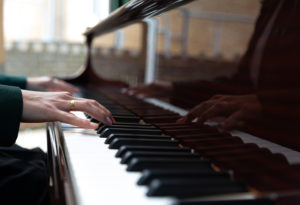Curriculum Intent

All students should have the opportunity to experience a musical education and understand the ways that music has shaped the cultural world in which we live today. Musical experiences have the ability to stay with us for life; therefore, we want all students to leave SHSG with their own memories of our department and the community which we foster here, from remembering composing their own Blues song in Year 8, or performing at prestigious concert halls both nationally and internationally. Students experience a rich curriculum where they are taught to perform and compose in a range of styles, developing an increasingly sophisticated knowledge of music and its influences exceeding the scope of the National Curriculum. Not only should students leave SHSG with an understanding and appreciation of a broad range of musical styles, they should also be able to justify their opinion and present their views with assurance. We want our students to be innovative, to be team-players and to have the drive to compete on the international stage. We want them to value a deep knowledge of musicology, to engage critically with the subject and perform and present with confidence, encouraging them not to shy away from hard work but instead harness the resilience that is required to be truly successful in music, embracing challenge and seeking opportunities to reach the next level.
What does it feel like to be a student in the Music Department?

As a musician at Southend High School for Girls, you are part of a unique community through which you are supported in exploring and developing your own personal musical interests and skills. Alongside a rigorous academic and creative curriculum, you will have the opportunity to engage with a range of musical styles and activities to broaden your thinking. Right from the start of your musical journey you will immerse yourself in academic and practical music in an integrated way, with opportunities to compose, perform, and analyse music both in curriculum and extra-curricular time.
By the end of Key Stage 3, you will have developed the necessary performance skills to be able to communicate musically both individually and in groups, you will be equipped with the compositional skills to organise musical ideas logically to create a specific effect, and you will listen to and appraise music belonging to a broad range of music. You will develop and hone your skills in each of these discrete areas across your GCSE studies, working with increasing independence to produce music that has a clear sense of personal style and maturity; most importantly, you will broaden your experience and interests, and develop your imagination and creativity.
Studying A Level music is a hugely rewarding endeavour not only in the classroom, but through your immersion in the subject practically as a performer and a composer, working with younger musicians to help shape their own love for the subject. You will study in detail the development of the symphony and explore the new directions explored in the twentieth and twenty-first centuries in classical music, as well as appraising music from the jazz, rock and pop, and musical theatre genres.
Our A Level students embody what it means to be an SHSG musician: astute, driven, collaborative, and passionate; with the academic competence to succeed on the most rigorous undergraduate degrees and the practical talent to excel in your chosen specialism, at Southend High School for Girls you will have the opportunity to grow into a truly unique and empowered musician. Whether or not you choose to take your musical studies further post-18, you will be suitably equipped to secure instrumental and choral scholarships at the most respected institutions in the UK and internationally; furthermore, during your seven years at SHSG, you will form lifelong friendships and become a part of a wider family of musicians who have contributed much to the life and legacy of the school. Once you leave Year 13, you will remain a part of this community and we will be proud to celebrate your personal successes with you, whether in the musical world or otherwise.
Please click on the button below to download the assessment policy for Music.
